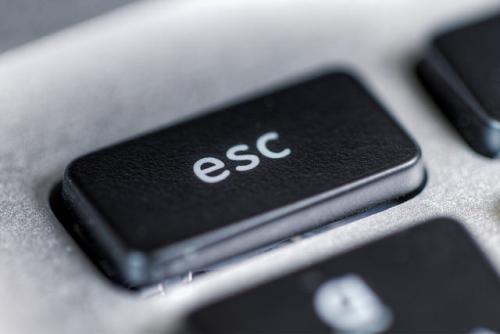
Image Credit:
It took me a while to accept that I can never have all the answers. It took even longer for me to realize that this is a wonderful, fortunate fact. As an instructor, a tenacious part of me clung to the fantasy of a future of flawless knowledge and perfect leadership. Sure, I’d tell myself, I flail about now and again in front of my students, bewildered by a question or flummoxed by a comment I wasn’t expected, but that’s just because I’m relatively new to my course materials, to this emerging technology, to [insert convenient excuse here]. I liked to think that someday I’d be completely comfortable fielding any and all student issues and problems. I’m letting go of that idealized notion of myself as a pedagogue chiseled out of marble while embracing the teaching potential of uncertainty. I’ll tell you why.
This semester I am teaching a version of 309K and I decided to switch to Canvas for my classroom learning management system. Not only did I choose to make the great migration away from Blackboard, but I made the resolution that I would go totally digital for the first time. Papers, peer review, grading, syllabus, all of it, everything, online. Over this past summer I watched countless videos on how to run a class through Canvas, determined to be an expert by the time I asked my students to use the LMS. Of course, the first time I asked my students to conduct a peer review through Canvas, we hit a few snags. My students bombarded me with concerns I hadn’t preemptively thought through. “The prompt doesn’t say how we should use the highlighter. What do we strike through? Do we download the original document? Can we track changes?” Uh oh. I felt any control I thought I had over the experience slipping away. My teaching ethos suffered for it, and I could sense myself getting uncomfortable. That’s when one of my students asked me if he could use Word to conduct his review so that he could track his changes. “You know how to do that?” I asked. “Sure.” He responded.
That’s when I basically turned my students lose, and the results were fantastic. I asked them to mess around with the available tools, admitted that I couldn't be muc help, and encouraged them to experiment. I’m going to ask each student to give a brief presentation on the method she/he developed for her/his own peer review. Some used Word, some stuck with the Canvas layout. By letting them know that they had room to explore an unfamiliar system, without me there to tell them precisely how to use it, we were collectively able to generate a variety of ways to approach one lesson plan. When a few of my students had basic functionality issues with the site, I encouraged them to think about how, instead of asking me for the answer, they might go about answering their own questions using internet tools at their disposal.
Effectively, I’m now trying to think of digital resources as landscapes to explore, not as tools that come with definitive instructions. I’m also trying with newfound determination to foster a learning community where the members can lean on one another (and on themselves) instead of me.

